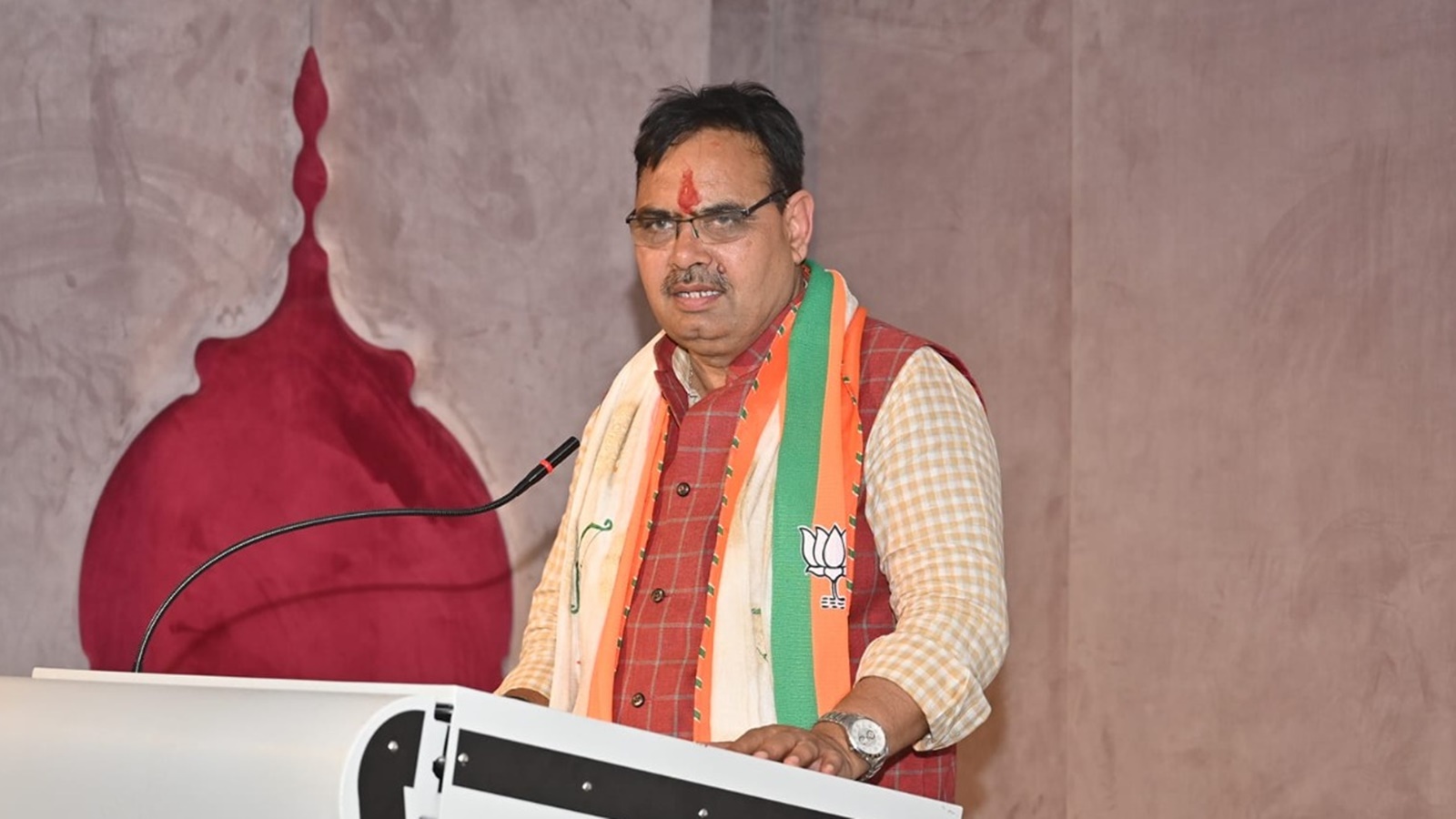On the inaugural day of their leadership, Chief Ministers of Madhya Pradesh, Rajasthan, Chhattisgarh, Mizoram, and Telangana embarked on a journey of immediate governance. The recently appointed Chief Ministers of Indian states wasted no time setting the tone for their leadership.
As we delve into the unfolding narratives of administration, let us find out the first-day decisions of the newly elected Chief Ministers.
Rajasthan CM on Terror and Paper Leaks
In the immediate aftermath of assuming office as the newly appointed Chief Minister of Rajasthan, Bhajan Lal Sharma wasted no time making significant announcements.
One notable decision was the establishment of a Special Investigation Team (SIT) tasked with probing cases related to paper leaks. Additionally, CM Sharma unveiled plans to combat organised crime by forming an Anti-Gangster Task Force.

In addressing the pervasive issue of paper leaks that have adversely impacted the morale of the youth in Rajasthan, Chief Minister Bhajan Lal Sharma articulated the need for immediate and robust action. Expressing concern over the decline of confidence in examination institutions, he underscored the decision to form a Special Investigation Team (SIT) dedicated to probing paper leak cases spanning the last five years.
CM Sharma emphasised a commitment to deploying stringent punishments for those involved in such heinous crimes, aiming to restore faith in the examination process. Furthermore, he promised to implement measures to prevent future paper leaks.
Highlighting the concerning rise of gangs and gangsters over the past five years, Chief Minister Bhajan Lal Sharma addressed the adverse impact on the state’s law and order, emphasising the plight of citizens living under the shadow of terror. Recognising the imperative need for restoration, Sharma announced a decisive step—forming a specialised Anti-Gangster Task Force. Led by an officer at the Additional Director General of Police (ADGP) level, this task force is poised to take effective action against all forms of organised crime.
Madhya Pradesh CM banned Loudspeakers
In his initial move as the newly appointed Chief Minister of Madhya Pradesh, Mohan Yadav made a decisive Cabinet decision on December 13 by instituting a ban on the use of loudspeakers beyond the permissible limits and designated time frames at religious and public locations.
Speaking at his inaugural press conference after the Cabinet meeting, CM Yadav emphasised that this prohibition aligns with the guidelines set forth by the Supreme Court regarding loudspeakers. To enforce this measure effectively, flying squads are set to be established in all districts and tasked with monitoring and reporting unauthorised loudspeaker use or violations of the prescribed rules within a concise three-day timeframe.

Addressing concerns about selling meat and eggs in open spaces, he revealed that directives have been issued to enforce adherence to the Food Safety Act and the Central government’s guidelines. Emphasising the importance of public awareness and business operators’ understanding of regulations, Yadav expressed the government’s commitment to effectively preparing for and implementing these measures.
In a significant move towards enhancing education in the state, the Chief Minister unveiled plans to establish a Pradhan Mantri Excellence College in each of the 52 districts. Operating aligned with the National Education Policy 2020, these institutions are poised to offer diverse courses starting from the next academic session.
Chhattisgarh CM’s Bid to provide homes
In a significant development during its inaugural Cabinet meeting, the newly sworn-in Bharatiya Janata Party government in Chhattisgarh approved the implementation of the Pradhan Mantri Awas Yojna for the benefit of over 18 lakh impoverished families residing in rural areas.
Chief Minister Vishnu Deo Sai, addressing the outcome of the meeting, highlighted the pivotal decision to provide homes to 18 lakh underprivileged individuals through the PM Awas Yojna. The government is poised to take prompt action to execute this decision shortly. Subsequently, an official government statement confirmed the sanctioning of 18,12,743 houses under this initiative.

The commitment to construct these houses is a cornerstone among the crucial pre-election promises made by the BJP. In a press conference held in Nava Raipur, Chief Minister Vishnu Deo Sai declared the decision to fulfil this pledge, emphasising that the benefits of the Central scheme were not adequately extended to people with low incomes in the past.
Addressing another pre-election commitment, the Chief Minister reiterated the promise of clearing outstanding bonuses owed to paddy farmers, pending from the previous BJP government. The CM reaffirmed his earlier announcement that the long-awaited bonus would be disbursed on December 25, coinciding with the birth anniversary of the late former Prime Minister Atal Bihari Vajpayee.
Telangana CM stands with the electoral promises

A decade after its establishment, Telangana witnessed the inauguration of its second Chief Minister, Anumala Revanth Reddy. Following the oath-taking ceremony, the 54-year-old CM implemented the Congress’ six election promises in his inaugural move.
These comprehensive guarantees, categorised as “Mahalakshmi,” “Rythu Bharosa,” “Gruha Jyothi,” “Indiramma Indlu,” “Yuva Vikasam,” and “Cheyutha,” outline plans for various segments of the population in Telangana.
As part of his second plan, Chief Minister Reddy aims to prioritise employment opportunities for disabled women.
Mizoram CM’s support for local agriculture
In line with Mizoram Chief Minister Lalduhoma’s commitment to promptly implement priority programs, the state government unveiled a proposal to allocate Rs 110 crore for directly purchasing critical agricultural products from farmers.

The targeted commodities include ginger, turmeric, chilli, and broomsticks, as part of the government’s policy to support local agriculture. During a meeting with officials from the finance, planning, and program implementation departments, Lalduhoma underscored the importance of this initiative, aligning with his earlier announcement of 12 priority programs to be executed within the first 100 days of his government’s tenure following the swearing-in ceremony on December 8.
Farmers will be given the flexibility to either sell their produce independently or opt for government procurement.
In addition, the meeting proposed allocating Rs 40 crore to settle pending medical bills under the state healthcare scheme. Furthermore, Lalduhoma urged officials to ensure timely disbursement of scholarships to students and initiate preparations for the upcoming state budget.











